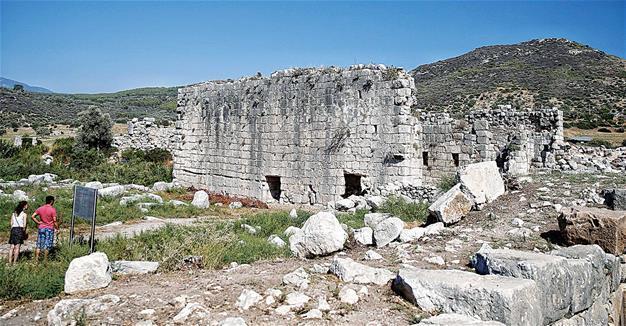Daily life tools shed light on Hellenistic era in Antalya
ANTALYA

Archaeological excavations in the ancient city of Patara in the southern province of Antalya’s Kaş district have unearthed 2,350 year-old tools used in daily life. Among them are a mirror frame and an iron fork.
Initiated in 1988, the excavations in Patara have been carried out by Akdeniz University Head of Archaeology Department Professor Havva Işık and her team.
Speaking to the Anadolu Agency, Işık said the capital of the Lycian union, Patara is one of the oldest ancient cities in the Mediterranean. She said Patara was mentioned in ancient resources as the prophecy center of Apollo, the god of all arts, music, sun, poetry and fire, adding that a significant Christian personality Saint Nicholas was born there and made his doctrines there.
“There are two important personalities for Patara. One is Apollo, which represents a pagan religion and the other is Saint Nicholas,” she added.
She said they focused on the Nero Bath and its vicinity this year and that excavations also continue in the basilica and Tepecik Acropolis in the city center.
Işık said they also work in the ruins of a bridge and mills in Kısık area and that the most important field in the excavations is Tepecik Acropolis.
She said that the earliest settlement was there and the most important findings in the city are being unearthed there. They try to shed light on the Hellenistic and Classical era with the excavations in this field.
Işık said they obtained many interesting findings during the Tepecik Acropolis excavations.
“We have found more than 200 pieces in a structure, which had collapsed during a fire. Food containers, weights, statuettes and coins as well as household goods are in very good condition. We think this was the house of a master. These artifacts have given us very important clues about the Hellenistic era in order to reach information about daily life in this era,” Işık said.
Baby bottle, mirror frame and forkDeputy head of the Patara excavations, Associate Professor Şevket Aktaş said the earthenware baby bottle, bronze mirror and the iron fork are especially among the most important findings.
“We think they had belonged to a notable person, a man or a woman. More than 200 household goods were found together. They date back to 2,350 years ago. We date them back to the end of the Hellenistic era and the beginning of the Classical era. We used to find broken pieces in the excavations. But this time we have found pieces in very good shape and it has made us very excited,” he explained.
The baby bottle, which is made of earthenware or kiln, were used to feed babies, said Aktaş. “These pieces help us understand family structure in this era,” he added.
The bronze mirror frame was among the most attractive pieces among the findings from Hellenistic era, said Aktaş. “Most probably, the structures where we have found these pieces had belonged to a rich person. Ordinary people did not use mirrors in this era, they were used by the nobles, the aristocratic people,” he added.
Aktaş also noted there were many weaving looms among the findings from 350 B.C.
 Archaeological excavations in the ancient city of Patara in the southern province of Antalya’s Kaş district have unearthed 2,350 year-old tools used in daily life. Among them are a mirror frame and an iron fork.
Archaeological excavations in the ancient city of Patara in the southern province of Antalya’s Kaş district have unearthed 2,350 year-old tools used in daily life. Among them are a mirror frame and an iron fork.